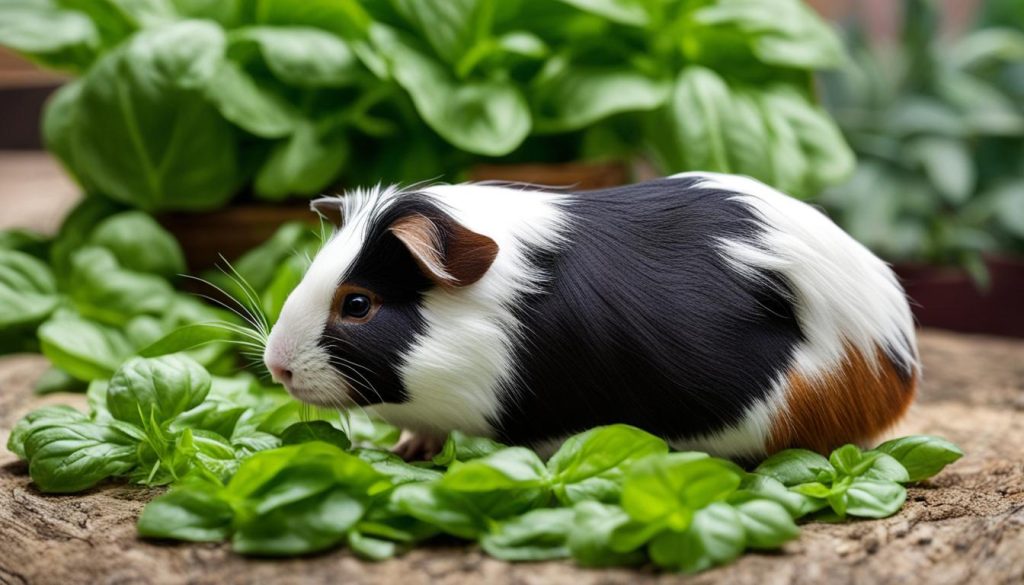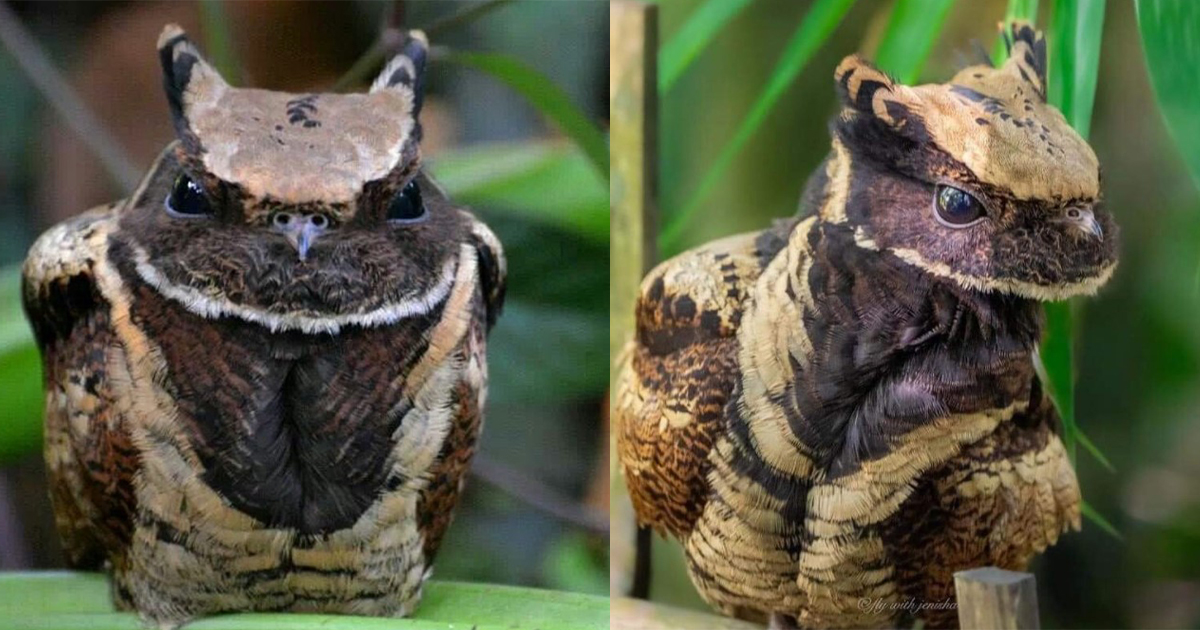Curious about whether guinea pigs can eat basil? Well, you’re in the right place! As a guinea pig owner, it’s important to understand the dietary needs of these adorable little creatures. In this article, I’ll share with you some fun facts and nutritional information about feeding basil to guinea pigs.
Can Guinea Pigs Eat Basil? But not too much.
- Basil is safe for guinea pigs to eat and can be a nutritious addition to their diet.
- Basil is rich in vitamin C, calcium, and antioxidants, which support guinea pig health.
- It is recommended to feed basil to guinea pigs a couple of times a week as part of their fresh vegetable portion, alongside a variety of other veggies for a balanced diet.
- However, excessive calcium intake should be avoided to prevent bladder stones.
- Consult a vet if you notice any abnormalities in your guinea pig’s appearance or behavior after feeding basil.
Guinea Pig Diet: What Should They Eat?
When it comes to the diet of guinea pigs, it’s important to provide them with a well-balanced and nutritious meal plan. A guinea pig’s diet should consist of hay, commercial food, fresh vegetables, fruits, and even herbs as treats. These different components work together to ensure that guinea pigs receive all the necessary nutrients for their overall health and well-being.
Hay, such as Timothy hay, is a crucial part of a guinea pig’s diet as it provides them with the roughage they need for proper digestion. Commercial food is another important component as it offers protein and fortified vitamin C, which is essential for guinea pigs since they cannot produce or store this vitamin on their own.
Fresh vegetables and fruits are also vital for guinea pigs as they supply additional vitamins and minerals. And yes, guinea pigs can enjoy herbs like basil as treats! Basil not only adds flavor to their diet, but it also provides essential nutrients such as calcium, manganese, iron, vitamin A, and vitamin K. It’s important to offer a diverse range of foods to guinea pigs to ensure they receive a balanced intake of nutrients.
Is Basil Safe for Guinea Pigs?
Guinea pigs can enjoy the delicious taste of basil as a treat, but like all foods, it should be given in moderation. While basil is generally safe for guinea pigs, it contains a higher amount of calcium compared to other herbs. Excessive calcium intake can lead to bladder stones, so it’s important to feed basil to guinea pigs sparingly.
When feeding basil to guinea pigs, it is recommended to offer one or two leaves a few times a week. This allows them to enjoy the flavor and nutritional benefits without consuming too much calcium. Adding basil as a treat can provide variety and enrichment to their diet, but it should not be the main component of their meals.
While basil is safe for guinea pigs, it’s important to note that not all herbs are suitable for their consumption. Oregano, rosemary, tarragon, yarrow, and sage contain either high levels of calcium or essential oils that may be harmful to guinea pigs. Additionally, chives, which are related to onions and garlic, are toxic and should be avoided.
By following moderation and avoiding herbs that are not safe for guinea pigs, you can ensure that basil remains a beneficial and tasty treat for your furry friend. Remember to always observe your guinea pig’s reactions and consult a veterinarian if you have any concerns about their diet.
Benefits of Basil for Guinea Pigs
Guinea pigs can benefit greatly from incorporating basil into their diet. This herb is not only safe for them to consume but also provides numerous health benefits. One of the main advantages of basil is its high vitamin C content, which is essential for guinea pigs since their bodies cannot produce or store this vital nutrient on their own.
In addition to vitamin C, basil is rich in antioxidants that help fight against aging and prevent diseases. These antioxidants contribute to a guinea pig’s overall health and well-being. Basil also contains significant amounts of fiber and protein, which aid in digestion and energy release. Furthermore, the zinc found in basil supports the immune system and helps with wound healing.
The vitamins and minerals present in basil are crucial for various aspects of a guinea pig’s health, including bone strength, eye health, and muscle maintenance. By incorporating basil into their diet, guinea pigs can enhance their overall health and receive important nutrients to support their well-being.
The Importance of a Balanced Diet
While basil offers several benefits for guinea pigs, it is important to remember the significance of a balanced diet. Basil should be provided as part of a varied menu that includes hay, commercial food, fresh vegetables, and fruits. This diverse range of foods ensures that guinea pigs receive all the necessary nutrients for their overall health and immune system.
It is important to feed basil in moderation and avoid excessive calcium intake, as this could lead to bladder stones in guinea pigs. Offering one or two leaves of basil a few times a week, alongside other vegetables, will provide a balanced intake of nutrients without overloading on calcium. By following these guidelines, you can ensure that your guinea pig enjoys the benefits of basil while maintaining a healthy and well-rounded diet.
How Much Basil Can Guinea Pigs Eat?
Feeding basil to guinea pigs is a great way to add variety and nutrients to their diet. However, it is important to offer it in moderation due to its calcium content. Too much calcium can lead to bladder stones, which can be painful and potentially dangerous for guinea pigs. It is recommended to feed one or two leaves of basil a few times a week as part of their fresh vegetable portion. This allows them to enjoy the benefits without consuming excessive amounts of calcium.
Observing your guinea pigs’ response to basil is crucial. Keep an eye on their appearance and behavior after feeding basil to ensure they are tolerating it well. If you notice any abnormalities, such as changes in appetite or a decrease in activity, it may be best to reduce or eliminate basil from their diet and consult a veterinarian.
Remember that basil should not be the sole vegetable in your guinea pig’s diet. It is important to provide them with a variety of fresh vegetables and fruits to ensure they receive all the necessary nutrients. Mixing basil with other safe foods helps create a balanced intake and prevents excessive calcium from a single source.

How often can guinea pigs have basil?
Guinea pigs can have basil a few times a week as part of their fresh vegetable portion. This frequency ensures they receive the benefits of basil without overloading on calcium. Remember to offer other safe vegetables and fruits alongside basil to provide a balanced and diverse diet for your guinea pigs.
Can Guinea Pigs Eat Other Herbs?
Guinea pigs can enjoy a variety of herbs in their diet, including basil. However, it’s important to be aware of which herbs are safe for them to consume. While basil is safe for guinea pigs, there are a few herbs that should be avoided. Oregano, rosemary, tarragon, and yarrow are high in calcium and not considered safe for guinea pigs. Sage, which contains essential oils, is also not recommended. Chives, which belong to the onion and garlic family, are toxic to guinea pigs and should never be given to them.
To provide a diverse range of safe herbs for your guinea pigs, it’s best to research and ensure the safety of each herb before including it in their diet. Basil, being a safe herb for guinea pigs, can be a flavorful and nutritious addition to their meals. Remember to feed basil in moderation, as excessive intake of calcium can lead to bladder stones. Mixing basil with other fruits and vegetables can provide a varied diet for your guinea pigs and ensure they receive a balanced intake of nutrients.
While guinea pigs can enjoy basil and other herbs, it’s important to be cautious and selective in choosing which herbs to include in their diet. Basil is safe for guinea pigs, but herbs like oregano, rosemary, tarragon, yarrow, sage, and chives should be avoided. By providing a diverse range of safe herbs, you can enhance your guinea pigs’ dining experience and contribute to their overall health and well-being.
Guinea Pig Dietary Guidelines
When it comes to the diet of your guinea pig, it’s important to provide them with the right balance of nutrients to ensure their overall health and well-being. Here are some guidelines to follow:
1. Mixed Vegetables
Include a cupful of mixed vegetables in your guinea pig’s daily diet. Opt for a variety of fresh vegetables and fruits to provide a diverse range of nutrients. This can include leafy greens like lettuce and spinach, bell peppers, carrots, and cucumbers. Remember to wash the vegetables thoroughly before feeding them to your guinea pig.
2. Hay for Fiber
Hay is an essential part of a guinea pig’s diet as it provides roughage and aids in digestion. Timothy hay is a popular choice and should be available at all times for your furry friend to nibble on. This helps keep their teeth healthy and prevents dental problems that can arise from overgrown teeth.
3. Commercial Food for Protein and Fortified Vitamin C
Guinea pigs require protein for growth and fortified vitamin C as they cannot produce or store it on their own. Commercial guinea pig food provides these essential nutrients and should be a part of their daily diet. Look for high-quality pellets specifically formulated for guinea pigs.
4. Herbs and Additional Nutrients
In addition to vegetables, fruits, and hay, you can also incorporate herbs into your guinea pig’s diet. Basil, for example, can be given as a tasty treat and provides additional nutrients like calcium, manganese, iron, vitamin A, and vitamin K. However, it’s important to feed herbs in moderation to avoid imbalances in their diet.
By following these guidelines and providing your guinea pig with a balanced and varied diet, you can ensure that they receive all the necessary nutrients for their optimal health and well-being.
Conclusion
Basil can be a nutritious addition to your guinea pig’s diet. It is safe for them to eat, and it provides essential nutrients like vitamin C, calcium, and antioxidants that support their overall health. However, it’s important to feed basil in moderation to avoid excessive calcium intake, which can lead to bladder stones.
Feeding your guinea pig one or two leaves of basil a few times a week, alongside a variety of other fresh vegetables, will ensure they receive a balanced intake of nutrients. Remember to observe your guinea pig’s response to basil and consult a vet if any abnormalities occur.
By following these guidelines and providing a diverse and nutritious diet, you can give your guinea pig a healthy and enjoyable dining experience. So go ahead and treat them to some basil, knowing that you’re contributing to their well-being.
FAQ
Can guinea pigs eat basil?
Yes, guinea pigs can safely eat both the leaves and stems of basil.
What nutrients does basil provide for guinea pigs?
Basil is an excellent source of vitamin C, with 18mg per 100g. It also contains calcium, fiber, manganese, iron, vitamin A, and vitamin K.
How often should I feed basil to my guinea pigs?
It is recommended to feed basil to guinea pigs a couple of times a week as part of their fresh vegetable portion.
What should be included in a guinea pig’s diet?
Guinea pigs require a well-balanced diet that includes hay, commercial food, fresh vegetables, and fruits.
Are there any herbs that guinea pigs should avoid?
Yes, guinea pigs should avoid herbs like oregano, rosemary, tarragon, yarrow, and sage. Chives, which belong to the onion and garlic family, are also toxic to guinea pigs.
How much basil can guinea pigs eat?
It is recommended to feed one or two leaves of basil a few times a week to guinea pigs.
What are the benefits of basil for guinea pigs?
Basil provides essential nutrients, supports digestion, boosts the immune system, and contributes to overall health and well-being in guinea pigs.
What are the dietary guidelines for guinea pigs?
Guinea pigs should be provided with a cupful of mixed vegetables each day, supplemented with hay, commercial food, and herbs, while observing moderation and offering a varied diet.






